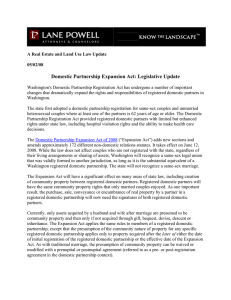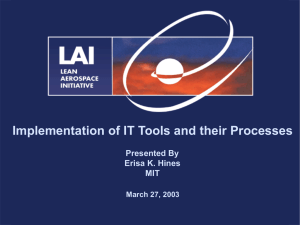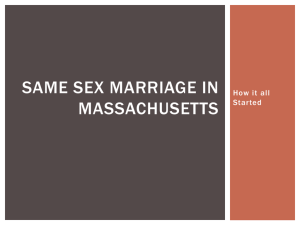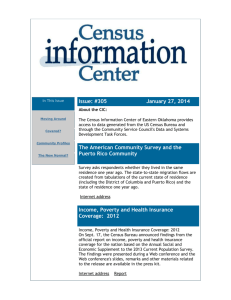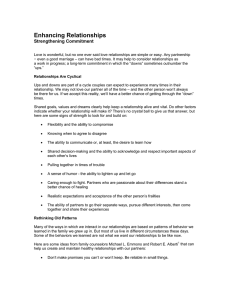T h e C h a r l... O n S e x u a l ...
advertisement
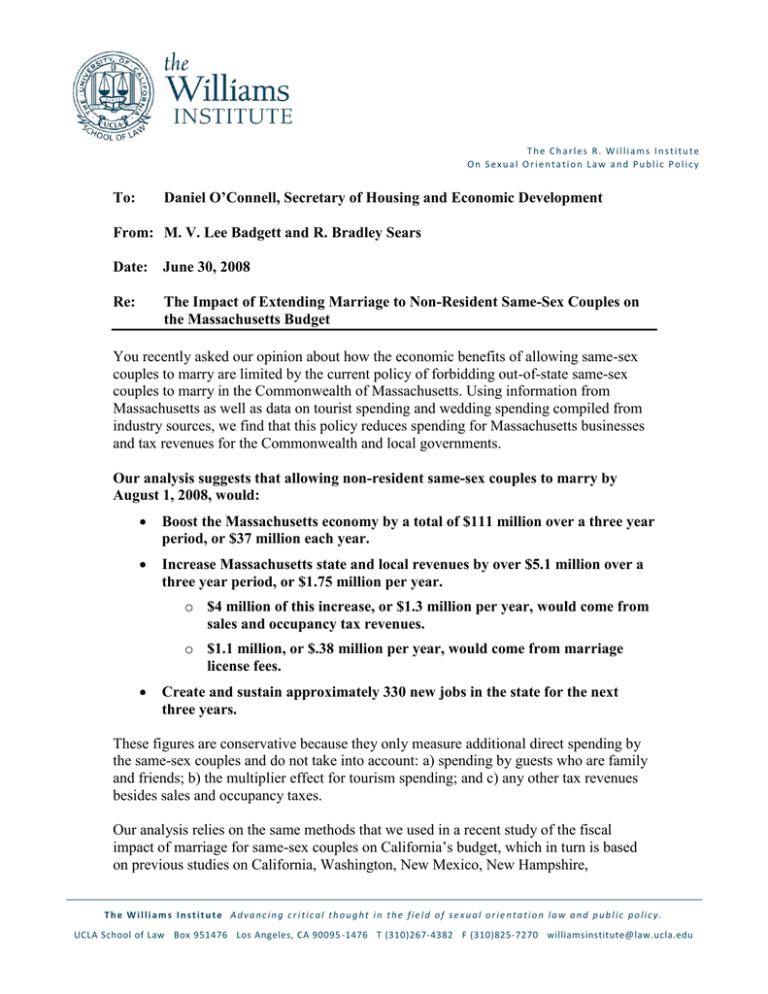
The Charles R. Williams Institute On Sexual Orientation Law and Public Policy Daniel O’Connell, Secretary of Housing and Economic Development To: From: M. V. Lee Badgett and R. Bradley Sears Date: June 30, 2008 Re: The Impact of Extending Marriage to Non-Resident Same-Sex Couples on the Massachusetts Budget You recently asked our opinion about how the economic benefits of allowing same-sex couples to marry are limited by the current policy of forbidding out-of-state same-sex couples to marry in the Commonwealth of Massachusetts. Using information from Massachusetts as well as data on tourist spending and wedding spending compiled from industry sources, we find that this policy reduces spending for Massachusetts businesses and tax revenues for the Commonwealth and local governments. Our analysis suggests that allowing non-resident same-sex couples to marry by August 1, 2008, would: Boost the Massachusetts economy by a total of $111 million over a three year period, or $37 million each year. Increase Massachusetts state and local revenues by over $5.1 million over a three year period, or $1.75 million per year. o $4 million of this increase, or $1.3 million per year, would come from sales and occupancy tax revenues. o $1.1 million, or $.38 million per year, would come from marriage license fees. Create and sustain approximately 330 new jobs in the state for the next three years. These figures are conservative because they only measure additional direct spending by the same-sex couples and do not take into account: a) spending by guests who are family and friends; b) the multiplier effect for tourism spending; and c) any other tax revenues besides sales and occupancy taxes. Our analysis relies on the same methods that we used in a recent study of the fiscal impact of marriage for same-sex couples on California’s budget, which in turn is based on previous studies on California, Washington, New Mexico, New Hampshire, The Williams Institute Advancing cri tical thought in the field of sexual orientation law and public policy. UCLA School of Law Box 951476 Los Angeles, CA 90095 -1476 T (310)267-4382 F (310)825-7270 williamsinstitute@law.ucla.edu Connecticut, Colorado, New Jersey, Vermont, Maryland, and Iowa. Below we briefly describe the assumptions and data behind our estimates. NUMBER OF SAME-SEX COUPLES WHO WILL MARRY Over 9,600 couples married within three years of Massachusetts’ historic decision to open marriage to resident same-sex couples. This constitutes 44% of the 22,000 same-sex couples in Massachusetts counted by the U.S. Census Bureau (based on the average count of same-sex couples in Massachusetts from the 2004-2006 American Community Surveys). Based on this experience, along with Vermont’s experience with civil unions, we estimate that approximately half of same-sex couples in the United States would wish to marry if allowed to do so. To estimate how many of those couples would travel to Massachusetts to marry if allowed, we take into account proximity, past tourism, and the varying policies of other states regarding the recognition of same-sex marriages. We divide up the states into several subgroups based on those factors. First, we assume no couples will come from California, where they can already marry, or from New Mexico and Rhode Island, which have already been told they can come to Massachusetts to marry. Second, New York is likely to be the biggest source of same-sex couples seeking to marry in Massachusetts for several reasons. In addition to its proximity, New York Governor David Paterson has directed state agencies to recognize the marriages of samesex couples performed elsewhere. Given those motivations, we adjust the 50% of New York’s same-sex couples who are likely to marry to take into account the fact that as many as 4% of New York’s same-sex couples may have already married in Canada and that some will already have married in California before the point at which we began our estimates. Therefore, we predict that 44% of the 48,761 same-sex couples living in New York, or 21,321 couples, will travel to Massachusetts to marry. Third, we assume more couples will come from states: 1) where they may have their marriage recognized in some manner, specifically, New Hampshire and New Jersey (where a same-sex marriage is treated as a civil union); 2) adjacent to Massachusetts; and 3) that already make up a large share of Massachusetts’ tourism market, namely Connecticut, Vermont, and Maine. We estimate that 25% of same-sex couples in these states will come to Massachusetts, or 7,560 couples. Finally, we estimate that 5% of couples in the remaining states would be willing to travel out-of-state to marry. Massachusetts will have strong competition from California for these couples. We allocate these couples between California and Massachusetts based on each state’s current share of domestic (United States) tourism,i generating 3,317 couples who would come to Massachusetts. Altogether, we estimate that 32,200 domestic same-sex couples would travel to Massachusetts to marry. WEDDING AND TOURISM SPENDING In order to estimate tourism expenditures derived from the 32,200 out-of-state couples who would likely marry in Massachusetts over the next three years, we draw on Massachusetts tourism data. Those data indicate that the average per person per diem spending for Massachusetts tourists is $108.70, and the average length of stay is 4.6 days.ii Based on this data, we estimate that couples traveling from beyond the states in Massachusetts’ immediate proximity will spend an average of $1,000 on travel-related expenses during their stay.iii Couples who live in neighboring states will have to come to Massachusetts to file an intention to marry on one day, and will have to return to conduct the wedding on a different day. Thus, we estimate they will spend two days and one night in Massachusetts, generating $435 in tourist spending. To make our estimates conservative, we do not account for guests who might attend, but we note that those guests could increase tourist spending considerably. In addition to tourism expenses, spending will also be generated by the wedding preparations themselves, including items such as ceremonies, meals, parties, transportation, flowers, photographs, and other expenses. According to The Wedding Report, a wedding industry research group, the average cost of a wedding in the United States during the next three years will be $29,624.iv Based on the logistical complications of planning an out-of-state wedding, we conservatively assume that the additional wedding spending by out-of-state couples will be one-tenth of the typical wedding expense, or $2,962. Thus, we estimate wedding and tourism spending at $3,962 per couple for couples from beyond Massachusetts’ immediate proximity and $3,397 for couples from neighboring states. Multiplying our estimate of out-of-state couples by this figure, we estimate that extending marriage to same-sex couples will boost the state economy by approximately $37 million annually and $111.3 million over the next three years. STATE AND LOCAL TAX REVENUES Next, we estimate state and local tax revenues from spending by out-of-state same-sex couples. Massachusetts has a state-wide sales tax of 5% and a state-wide occupancy excise tax of 5.7%. However, we estimate the total occupancy tax at 9.7% because Boston, Northampton, Provincetown, Worcester, and Cambridge are sources of a large proportion of same-sex weddings and have added a 4% local option to the state occupancy tax. Based on these figures, we estimate that spending by out-of state couples will generate more than $1.3 million in tax revenues for the state within the first year and $4 million within three years time. The weddings of both in-state and out-of-state same-sex couples will also generate revenues for counties through marriage license fees. Massachusetts statutes mandate a minimum $4.00 charge for marriage licenses; however, marriage license fees vary by city, town, or municipality. We use an average of the marriage license fees of Boston, Northampton, Provincetown, Worcester, and Cambridge, which is $35.00, as the best amount to measure the impact these revenues will have on the state’s budget.v Marriage license fees alone will bring Massachusetts over $1.1 million in three years. These taxes only capture the most direct tax impact of increased tourism; they do not include increased taxes from earnings. Businesses and individuals will also pay taxes on the new earnings generated by wedding spending, providing a further boost to the state budget. JOB CREATION Finally, using data from the Massachusetts Office of Travel and Tourism for 2006, we estimate that this spending will create and sustain approximately 330 new jobs over the next three years.vi i Shifflet, D.K. & Associates Ltd. California Domestic Travel Report 2006. September 2007 at:http://www.visitcalifornia.com/AM/CM/ContentDisplay.cfm?ContentFileID=2693&MicrositeID=0&Fus ePreview=Yes (Last accessed on June 27, 2008). California has an 11.5% market share of total domestic tourist volume, compared to Massachusetts’ 1.49%. ii Tony D’Agostino, of the Mass. Office of Travel & Tourism, identified, in a telephone conversation on 6/16/08, $500.00 as the average tourist expenditure. We divided this figure by the average tourist stay (4.6 days), from their 2005 Massachusetts Domestic Visitor Profile report, to come up with the per person per diem figure. See Massachusetts Domestic Visitor Profile: Calendar Year 2004, Massachusetts Office of Travel & Tourism, April 29, 2005 at http://www.massvacation.com/pdf/domprof04.pdf (last accessed on June 26, 2008). iii We assume that couples from New York, Connecticut, New Hampshire, New Jersey, Maine, and Vermont will only spend two days in Massachusetts due to the close proximity of their home state. iv The Wedding Report. Industry Report-US Only-Total Spending Report. Total Spending by Year. http://www.the weddingreport.com/wmdb/index.cfm?action=db.viewdetail&func=2.1 (last accessed June 27, 2008). Here we use the three year average for 2008 to 2010. v See http://www.cityofboston.gov/registry/marriage.asp; http://www.co.worcester.md.us/faq/marriagelicenses.html.http://www.northamptonma.gov/cityclerk/upload s/listWidget/5407/How%20to%20obtain%20a%20marriage%20license.pdf; http://provincetown-ma.gov ; http://citysource.com/City_Hall/Lic_Pub_Rec/ct_clerk.html (last accessed on June 27, 2008). vi In 2006, $14.21 billion dollars of direct tourism spending in Massachusetts supported 125,800 jobs. See http://w\ww.massvacation.com/research/#aImpact (last accessed on June 27, 2008).

